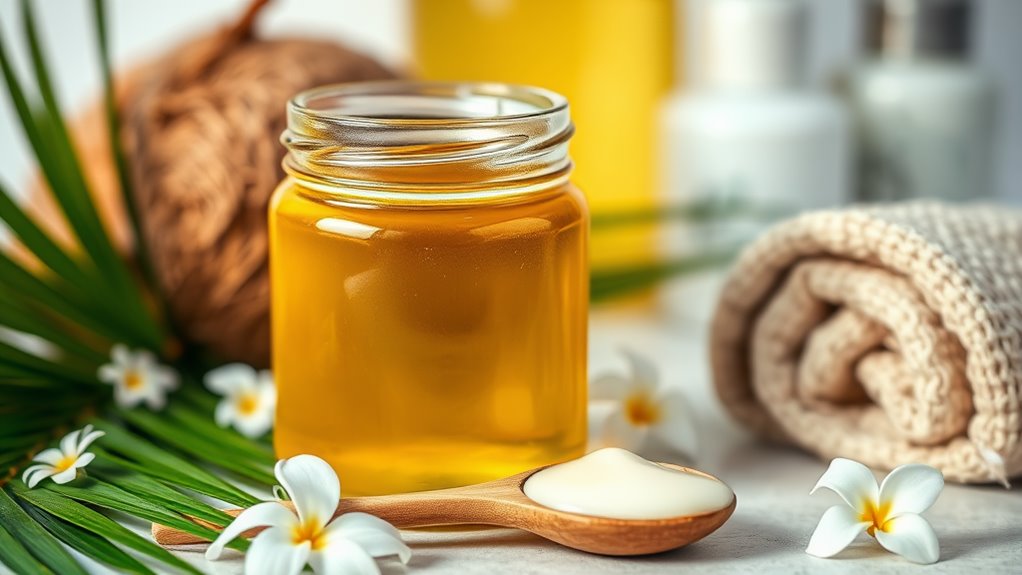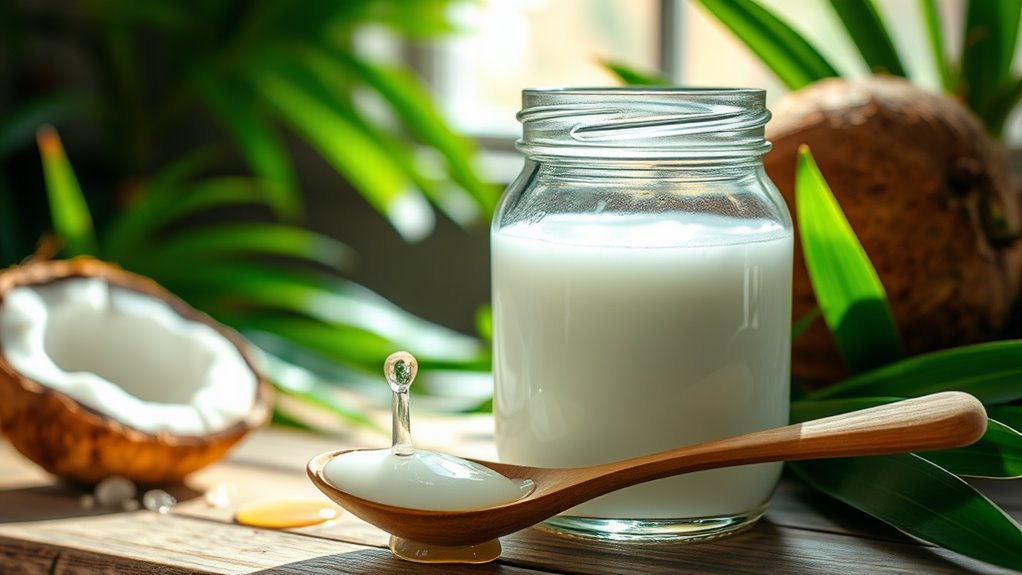How to Use Coconut Oil for Skin, Hair, and More
Coconut oil isn’t just a cooking staple; it’s a powerhouse for your skin and hair too. Many people overlook its multifunctional benefits, from moisturizing dry patches to taming frizz in hair. Wondering how you can incorporate this natural remedy into your daily routine? Whether you’re looking for a natural moisturizer or a deep conditioning treatment, there’s a lot more to coconut oil than meets the eye. Let’s explore how to make the most of this versatile oil.
Key Takeaways
- Massage warm, organic coconut oil into skin for hydration and to soothe irritation, especially after showers or at night.
- Use coconut oil as a gentle makeup remover by massaging it onto makeup areas and wiping with a soft cloth.
- Apply coconut oil as a deep conditioning treatment to nourish dry hair and reduce frizz, promoting overall hair health.
- Create DIY hair masks by mixing coconut oil with honey or essential oils for added moisture and shine enhancement.
- Utilize coconut oil to soothe minor cuts or sunburn, while also benefiting from its antimicrobial properties to combat acne.
Benefits of Coconut Oil for Skin
Coconut oil is a versatile gem in skincare, offering a range of benefits that can enhance your beauty routine.
One of the most popular coconut oil uses is its ability to hydrate and nourish your skin, making it an excellent choice for dry or flaky patches. Its natural antibacterial properties help combat acne, while its antioxidants protect your skin from environmental damage. Additionally, coconut oil’s antimicrobial power can help maintain a clear complexion by reducing harmful bacteria.
You’ll also find that coconut oil can soothe irritated skin, reducing redness and inflammation. Plus, it’s fantastic for makeup removal, effortlessly breaking down even the toughest products. Additionally, its antimicrobial properties make it effective against bacteria and fungi, promoting overall skin health.
Incorporating coconut oil into your routine can lead to a healthier, more radiant complexion, making it a must-have in your skincare arsenal.
How to Use Coconut Oil as a Moisturizer
Using coconut oil as a moisturizer can elevate your skincare routine, especially if you’re looking for something natural and effective.
Start by choosing high-quality, organic coconut oil for the best results. Warm a small amount in your hands until it melts, then gently massage it into your skin using circular motions. Focus on areas that tend to be dry, like elbows and knees. Coconut oil’s unique molecular structure allows it to penetrate deeply, providing enhanced hydration.
You can apply it after a shower for maximum absorption, or use it as a nighttime treatment to lock in moisture. If you have oily skin, use it sparingly to avoid clogged pores.
For added benefits, mix a few drops of essential oil to enhance the scent and therapeutic effects. Additionally, coconut oil contains antioxidants that protect cells from damage, contributing to healthier skin. Enjoy your hydrated, glowing skin!
Coconut Oil for Hair Care
Coconut oil can transform your hair care routine with its powerful benefits. Use it as a deep conditioning treatment to nourish your locks and combat dryness, or apply it to tame frizz for a sleek look. You’ll love how easy it’s to achieve healthier, shinier hair with just this one natural ingredient. Additionally, its antimicrobial properties promote a healthier scalp, reducing dandruff and enhancing overall hair health. Regular use of coconut oil can also help strengthen hair strands and prevent breakage, leading to longer, more resilient hair.
Deep Conditioning Treatment
When your hair feels dry and lifeless, a deep conditioning treatment with coconut oil can work wonders.
Start by warming a small amount of coconut oil in your hands until it’s melted. Apply it generously from your scalp to the tips of your hair, focusing on the ends where damage often occurs. For best results, section your hair to guarantee even coverage.
Once applied, wrap your hair in a warm towel or shower cap to help the oil penetrate deeply. Leave it on for at least 30 minutes, or overnight if you can.
Then, wash it out with shampoo and follow with your regular conditioner. Your hair will feel softer, shinier, and more nourished after just one treatment!
Frizz Control Solution
After giving your hair a nourishing deep conditioning treatment, you might still face the challenge of frizz.
Luckily, coconut oil serves as an excellent frizz control solution. To use it, warm a small amount in your hands until it melts, then apply it to your damp hair, focusing on the ends. This will help seal moisture and tame flyaways.
If your hair’s particularly unruly, you can also use coconut oil as a finishing touch. Just rub a tiny amount between your palms and lightly smooth it over your styled hair.
Remember, a little goes a long way! With consistent use, you’ll notice a significant reduction in frizz, leaving your hair looking sleek and shiny.
Enjoy your fabulous locks!
DIY Coconut Oil Hair Masks
If you’re looking to transform your hair, DIY coconut oil hair masks are a fantastic solution. You can easily whip up a nourishing blend to restore shine or create a repairing treatment for dry, damaged strands. Regular use of coconut oil can reduce protein loss and enhance overall hair health. This is because coconut oil forms a protective layer around your hair, minimizing moisture loss. Let’s explore some simple recipes that can bring your hair back to life!
Nourishing Coconut Oil Blend
Creating a nourishing coconut oil blend for your hair is a great way to enhance its health and shine.
Start with a base of virgin coconut oil, known for its moisturizing properties. To boost the blend, add a few drops of essential oils like lavender or rosemary, which can promote scalp health and add a lovely scent.
You can also mix in a tablespoon of honey for extra hydration. Warm the mixture slightly to help it combine and apply it evenly throughout your hair, focusing on the ends.
Leave it on for at least 30 minutes before washing it out with your favorite shampoo. This blend will leave your hair feeling soft, shiny, and revitalized!
Repairing Dry Hair Treatment
Dry hair can feel lifeless and unmanageable, but a DIY coconut oil hair mask can work wonders to restore its energy.
To create your mask, combine two tablespoons of coconut oil with one tablespoon of honey for added moisture. Warm the mixture slightly to help it blend and absorb better.
Apply it evenly to dry hair, focusing on the ends. Leave it on for 30 minutes, then wash it out with your regular shampoo. You’ll notice smoother, shinier hair after just one treatment!
For best results, use this mask once a week. Coconut oil not only hydrates but also strengthens your hair, helping to prevent breakage and split ends.
Give your hair the love it deserves!
Using Coconut Oil for Makeup Removal
Since your skin deserves gentle care, using coconut oil for makeup removal is an excellent choice. This natural oil effectively dissolves makeup without stripping your skin of moisture. Additionally, its antimicrobial properties help keep your skin clean and healthy.
Plus, it’s suitable for all skin types, even sensitive skin!
Here’s how to use coconut oil for makeup removal:
- Warm the oil: Take a small amount and rub it between your hands until it melts.
- Apply: Gently massage the oil onto your face, focusing on areas with makeup.
- Wipe off: Use a soft, damp cloth or cotton pad to remove the oil and makeup.
- Rinse: Follow up with your regular cleanser to verify all residue is gone.
Coconut oil also functions as an effective makeup remover, making it a versatile addition to your beauty routine.
Enjoy a fresh, clean face while nourishing your skin with coconut oil!
Coconut Oil as a Natural Sunscreen
Coconut oil isn’t just great for your skin; it can also offer some UV protection when you’re out in the sun. To get the most benefit, you’ll want to apply it properly and reapply it throughout the day. Additionally, the unique fatty acids in coconut oil may help in nourishing and hydrating your skin while providing a natural barrier against the sun. Furthermore, the presence of medium-chain triglycerides in coconut oil contributes to its effectiveness in promoting skin health. Let’s explore how to use coconut oil effectively as a natural sunscreen while keeping your skin safe and nourished.
UV Protection Benefits
When it comes to natural sun protection, coconut oil offers some impressive UV protection benefits that you mightn’t expect. While it shouldn’t replace your regular sunscreen, it can provide a lighter layer of defense.
Here’s what you should know:
- Contains SPF properties, offering some degree of UV protection.
- Rich in antioxidants, which help neutralize free radicals from sun exposure.
- Moisturizes your skin, reducing the risk of sunburn-related dryness.
- Helps soothe skin after sun exposure, promoting healing.
Keep in mind that coconut oil is best used in conjunction with other sun protection methods.
Application Tips and Techniques
Applying coconut oil as a natural sunscreen requires a few simple techniques to maximize its effectiveness.
First, choose a high-quality, unrefined coconut oil for the best results. Before heading outdoors, generously apply the oil to all exposed skin about 20 minutes prior to sun exposure. This allows for better absorption and protection.
Remember to reapply every two hours, or more often if you’re swimming or sweating. For sensitive areas like your face and neck, use a lightweight application to avoid clogging pores.
If you’re planning to be in direct sunlight for extended periods, consider pairing coconut oil with a hat or protective clothing for added defense.
Enjoy the sun safely while nourishing your skin!
Coconut Oil in Skin Treatments
As you explore natural remedies for skincare, you’ll find that coconut oil stands out for its versatility and effectiveness.
This tropical oil is packed with nourishing properties that can benefit your skin in many ways. Here are some practical uses for coconut oil in skin treatments:
- Moisturizer: Keeps skin hydrated and prevents dryness. Additionally, its fatty acids help to lock in moisture effectively.
- Makeup Remover: Gently dissolves makeup without harsh chemicals.
- Healing Agent: Aids in soothing minor cuts, scrapes, and sunburn.
- Anti-Aging: Rich in antioxidants, it helps reduce the appearance of fine lines.
Incorporating coconut oil into your skincare routine can lead to healthier, glowing skin. Additionally, its antimicrobial properties can combat acne effectively.
Just remember to patch test first to guarantee you don’t have any adverse reactions!
Cooking With Coconut Oil: Health Benefits
While coconut oil is a fantastic addition to your skincare routine, its benefits don’t stop there. Cooking with coconut oil offers numerous health advantages too. Rich in medium-chain triglycerides (MCTs), it can boost your metabolism and provide quick energy. Plus, it’s a great alternative to traditional cooking oils due to its high smoke point.
Here’s a quick look at its benefits:
| Benefit | Description | Usage Tips |
|---|---|---|
| Metabolism Boost | Increases fat burning | Use in smoothies |
| Heart Health | May improve cholesterol levels | Drizzle over salads |
| Antimicrobial | Fights harmful bacteria | Use in baking |
| Nutrient Absorption | Enhances absorption of fat-soluble vitamins | Cook vegetables in it |
Incorporate coconut oil into your meals for a healthier lifestyle!
Coconut Oil for Oral Health
Coconut oil is more than just a versatile cooking ingredient; it’s also a powerful ally for your oral health. Incorporating coconut oil into your daily routine can provide numerous benefits that help maintain a healthy mouth.
-
Reduces harmful bacteria: Its antimicrobial properties can help fight harmful bacteria in your mouth.
-
Whitens teeth: Regular use can lead to a brighter smile by reducing stains.
-
Freshens breath: Swishing with coconut oil can leave your breath feeling fresh.
-
Soothes gums: Its anti-inflammatory properties can alleviate gum irritation and support overall gum health.
Try incorporating coconut oil through oil pulling or by using it in your oral care routine to experience these benefits firsthand!
Tips for Choosing Quality Coconut Oil
How can you guarantee you’re choosing the best coconut oil for your needs? Start by looking for “extra virgin” or “cold-pressed” labels. These methods retain more nutrients and flavor.
Check the ingredient list—pure coconut oil should contain only coconut oil, without additives or preservatives. Pay attention to the sourcing; organic, sustainably sourced oils are often of higher quality.
Smell the oil, too; it should have a pleasant, coconut scent, not a chemical or rancid odor.
Finally, consider packaging; dark glass bottles protect the oil from light damage, preserving its quality.




